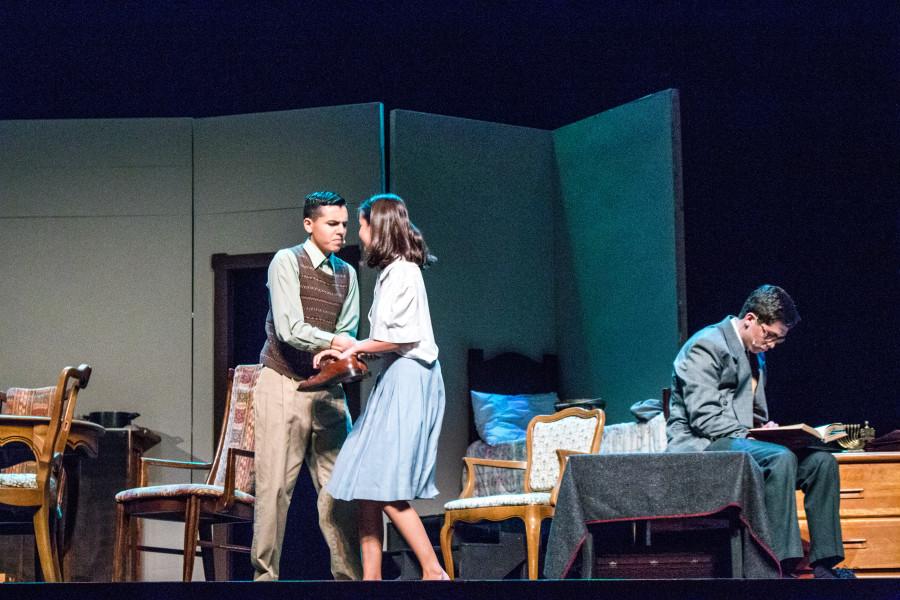DV Drama gets serious with “Diary of Anne Frank”
December 10, 2015
Through Nov. 12-14, the DVHS Drama Program took a risk with its more serious production of “The Diary of Anne Frank” and proved the drama team’s capabilities of making an impact, despite a somber storyline.
Five minutes before the show started, we walked down the sloping aisles in the half-full theatre, slipping through the inconspicuous side door that led backstage. The green room teemed with actors preparing for the show, some appearing calm and composed, others pacing around nervously. Many of the actors playing adult characters had heavily made up faces, courtesy of the Drama department’s makeup artists Kyle Doan and Erika Gwin, that easily made them look 30 to 40 years older, with previously nonexistent forehead and eye wrinkles now etched deep into pale foundation. The actors were called to their places and the lights dimmed in the theater.
The first act before intermission started slowly to set the context and background of the play in preparation for the dramatic climax in the second act. Two Jewish families go into hiding in the cramped upstairs area of a sympathetic German family’s house during the World War II Holocaust. The Franks, consisting of Mr. (Dillon Aurelio-Perata) and Mrs. (Devyn Diolazo) Frank, Margot (Kelsey Villareal) and Anne (Marie Bast), move in with Mr. (Jake Ottley) and Mrs. (Katie Stroud) Van Daan and Peter Van Daan (Francis Arroyo), and are aided by sympathetic Germans Mr. Kraler (Joseph Rodriguez) and Miep (Natalia Khoudian), who bring them resources and information from the outside. Mr. Dussel (Jun Yu), a dentist, moves in later. Living with both constant fear and complete boredom, the families must make the best of their minimal rations and privacy, trying their best to prevent growing tensions from consuming them.
The overall atmosphere in the first act was somber, as expected. Although the background information stretched out for most of the act and there were oftentimes excessively long silences between scenes or in dialogue, the dialogue between characters and Anne’s monologues were key to character development. Certain scenes showed the fragility of Mrs. Frank’s emotions, Peter’s obvious irritation towards Anne or the tension within the Van Daan family. In between, a few sly jokes were slipped in that made the audience laugh collectively, despite the generally depressing mood.
Both Bast and Vega commented that the audience’s responses towards certain parts of the play that called for laughter or attentive silence greatly helped the show progress.
“The humor was well received,” Vega noted. “Even though [“The Diary of Anne Frank”] is a darker play, there is still humor in it.”
Long pauses were scattered throughout the play, specifically within the first act. After a few last words from one of the characters onstage, the stage lights dimmed and the theatre lights brightened. For a few awkward, confusing minutes, the entire audience in the theatre sat in silence. Not one person moved from their seats; everyone sat, watching the stage expectantly. The actors were still there, walking around in the dark, as if oblivious to the light change. Some people began looking around puzzled, until finally a man from the back opened up the window and announced, “It’s intermission.”
With a collective sigh of realization and sheepish laughter, the audience rose and began moving about again.
Most of the audience thought that while the first act was slow-going, it was necessary to reveal plot setting and background.
Senior Chaitanya Sharma said that the actors did “a great job of establishing [the setting], showing their emotions and setting up the scene for the second half, which will get more exciting.”
As Sharma predicted, the second act sped up in terms of drama and romantic relations. Aside from the abrupt, shocking ending, Mr. Van Daan’s bread-stealing scene and the growing romantic relationship between Peter and Anne were the highlights of the play that the cast particularly enjoyed.
Both Arroyo and Yu mentioned the “kissing scene” between Anne and Peter as their favorite because it was the romantic climax in their relationship.
“Anne and Peter had chemistry and really connected,” Arroyo said.
Mikhail Adlin, who played German Soldier 1, enjoyed the scene in which Mr. Van Daan steals bread in the middle of the night out of desperation and is caught by Mrs. Frank, but is saved from being thrown out into the streets by the other inhabitants by the compassionate Mr. Frank.
“[This scene] shows how family can stay close together in times of hardship,” he said.
After the German soldiers stormed across the stage, yelling at the protagonists and shoving them offstage, the play closed with the lone aside of Mr. Frank, speaking to the audience as the beautiful glow of Hebrew words, presumably from Anne’s original diary, illuminated onto the set. He reported how his family and friends had died, as he was the only survivor. Aurelio-Perata was able to portray his character’s devastated emotions, and walked away leaving an eerie silence that was unbroken until the cast stepped out for the finale.
A parent noted that the production was “well done,” and closely followed the main parts of the original book.
Overall, the play was well-performed and the actors created a somber yet hopeful atmosphere. The lighting and sound effects were expertly timed, and there were virtually no mistakes in the cast’s acting. Although “Anne Frank” did not evoke tears and was slow to start, the story about two Jewish families subject to constant fear and cramped living space was still filled with romance and hope in times of desperation, hitting home for the audience.
Vega and his theatre crew took a great risk by veering away from their typical laugh-out-loud comedy, instead choosing a more serious and dark play as their first production of the year. It could have been a crushing failure, badly received by the audience. Yet on the contrary, “The Diary of Anne Frank” was a general success.
Vega in particular could not be prouder of his cast. “Their hard work showed well on stage,” he said.



